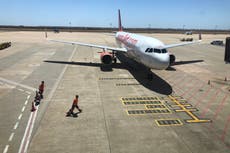Pence breaks silence to take credit for Pfizer vaccine - and drugs company immediately denies Trump involved
Pfizer has clarified that the US government was not involved in their development of a Covid-19 vaccine
Mike Pence has broken his post-election silence to trumpet the Trump administration’s backing of a new coronavirus vaccine - only for the company to immediately point out that the research and development of their vaccine had nothing to do with the government.
Pfizer announced on Monday morning that their Covid-19 vaccine was 90 per cent effective, in early trials.
"HUGE NEWS: Thanks to the public-private partnership forged by President @realDonaldTrump, @pfizer announced its Coronavirus Vaccine trial is EFFECTIVE, preventing infection in 90% of its volunteers," tweeted Mr Pence.
Nikki Haley, Mr Trump’s former UN ambassador, also claimed that the Pfizer work was down to Mr Trump, saying: “Many thanks”.
Seemingly unaware that Pfizer had very publicly rejected federal funds, she said: "This will be one of the most important action items done by the administration in response to this pandemic."
But the New York-based company was quick with a clarification.
Dr Kathrin Jansen, Pfizer’s head of vaccine development, told the New York Times: “We were never part of the Warp Speed ... We have never taken any money from the US government, or from anyone.”
Pfizer later clarified that they were considered “part” of Warp Speed, because the US government had placed an order for a potential vaccine. But they received no funding for its development, unlike their rivals.
Follow live: US election 2020 results, analysis and updates
Operation Warp Speed is a $12bn (£9.1bn) government programme, begun in May, to supply a vaccine to 300 million Americans.
Pfizer, which developed the vaccine with the German drugmaker BioNTech, did not provide full details from its clinical trial, but experts have hailed it as a significant breakthrough.
Equally significant is the fact that the US-based company - unlike other vaccine front-runners - refused to take government money for research and development, in a bid to preserve their independence.
Ms Jansen said she learned of the results from the outside panel of experts shortly after 1pm on Sunday, and that the timing was not influenced by the election.
“We have always said that science is driving how we conduct ourselves — no politics,” she said.
Albert Bourla, chairman and CEO of Pfizer, on 1 October wrote an open letter to his US colleagues lamenting the fact that a vaccine was being “discussed in political terms rather than scientific facts”, and saying he had been left “disappointed” by the weaponisation of public health.
“The amplified political rhetoric around vaccine development, timing and political credit is undercutting public confidence,” he warned.
"We would never succumb to political pressure. The only pressure we feel — and it weighs heavy — are the billions of people, millions of businesses and hundreds of government officials that are depending on us.
“We’ve engaged with many elected leaders around the globe through this health crisis, but Pfizer took no investment money from any government. Our independence is a precious asset.”
In September he had made the same point, saying: “I wanted to liberate our scientists from any bureaucracy. When you get money from someone, that always comes with strings.”
A fierce debate broke out online about the accuracy of Mr Pence and Ms Haley’s statements.
Some pointed out that Pfizer was indeed supported by the US government, because the company agreed in July a $1.95 billion deal to buy the vaccine, once it was ready.
James Surowiecki, an author and business journalist, said: “The US precommitted to pay $1.95 billion for 100 million doses of Pfizer's vaccine once it was approved, regardless of whether other vaccines were available/better. That gave Pfizer the certainty to invest in its development. It is, in fact, a partnership.”
Others said that Mr Surowiecki was splitting hairs, and that Pfizer was right to emphasise that they did not receive government funding, because they were exposed to all the cost and risk of vaccine development. Furthermore, they argued, Pfizer would have worked to develop the vaccine without the US pre-order.
Joe Biden’s team welcomed the “excellent news”, but reminded people that it was still early days, and taking steps to prevent the spread of the virus - like wearing a face mask - were still the most important thing to remember.
Join our commenting forum
Join thought-provoking conversations, follow other Independent readers and see their replies
Comments

Bookmark popover
Removed from bookmarks